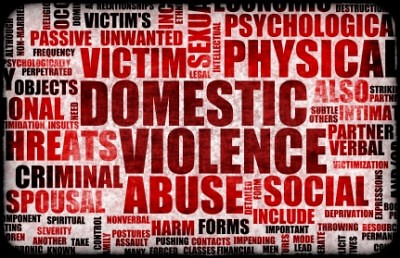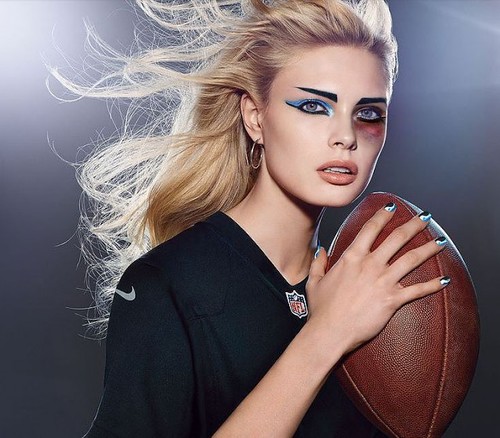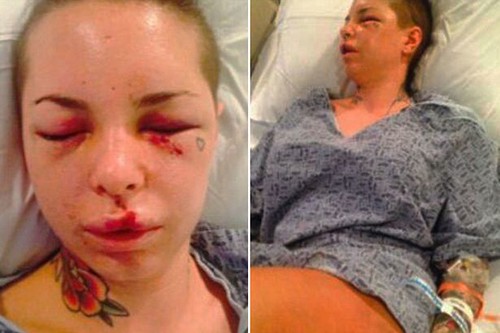Domestic Violence Awareness Month
I'm going to make a pretty controversial statement, and I'd like you to bear with me while I explain myself. Are you ready?
I think we should cancel Breast Cancer Awareness month.
Honestly, it's not because I'm some kind of terrible person who has no empathy for those fighting breast cancer. Really, I promise. Cancer has been serious business in my family, and it's not something that I take lightly.
However, before October was chosen as Breast Cancer Awareness month, it was Domestic Violence Awareness month. I feel like that issue has gotten lost in the shuffle, despite the fact that it's something that is actually affected by increasing its visibility.

Let's start off with some good news - intimate partner violence has declined significantly in the past 20 years, ever since the passage of the Violence Against Women Act in 1994. We have made a lot of strides towards keeping women safe, and giving them the resources they need to get out of abusive relationships. Since people raised in households were domestic violence occurs are more likely to become abusers themselves, it seems likely that it will only continue to decline in the future.
However, there are some segments of the population that are still at much greater risk of domestic violence. Women with disabilities are 2 to 4 times more likely to be victims of domestic violence, and it tends to last longer and be more serious than in the general population. African American women are 2.5 times more likely to be murdered by an intimate partner than white women are. An astonishing 40% of Native American women are subject to domestic violence, putting them at a 50% greater risk than the next highest population. So while progress has been made, there is still a lot of work to be done to ensure the safety of vulnerable members of our society.
In some ways, breast cancer is an easy thing to talk about, an easy thing to rally against. It is unequivocally bad. It strikes at random, and anyone, good, bad, or indifferent, can get it. There's no controversy to it, so people like to get behind the cause and the funny, slightly racy slogans and events that come with it.
It seems like in the month of October, any company looking for good PR with the ladies runs some sort of promotion related to breast cancer awareness. The market is over-saturated with pink - pink ribbons, pink dresses, pink lipstick, pink water bottles, pink yogurt cups, pink necklaces, pink sunglasses, pink belly button rings, pink armbands on NFL players (more on that in a minute). I don't doubt the sincerity of the people who choose to buy these items, but I can't help but think that it's little more than a cynical marketing ploy on behalf of many of the companies that sell them. At this point, I'd say we're about as aware of breast cancer as a society can be; in pop cultural, it's devolved into little more than a cutesy slogan. While I'm sure many survivors appreciate the support, I have seen some women who hate that the vicious disease that has caused them so much pain and fear has become "Save the Boobies!", something cheeky and winking.

One example of the issue that I take with using Breast Cancer Awareness as a PR prop to get in good with the ladies is those pink armbands that NFL players wear, which I mentioned above. The NFL has had some serious and high profile issues with domestic violence - mostly recently, the furor that erupted when a video surfaced of Ray Rice brutally punching his then-fiance, Janay, in the face. For the past few years, the NFL has attempted to court female fans by promoting breast cancer awareness, and that has not changed this year, despite the rising concerns about the violence in their ranks. There is a Change.org petition circulating encouraging them to wear purple in support of Domestic Violence Awareness, but I have doubts about its potential success.

These photoshopped images of Covergirl ads, the "Official Makeup Sponsor of the NFL!" have been making waves on the internet recently.
One of the reasons I think it's so important to bring domestic violence to the fore is the way that we tend to talk about it. Domestic violence is like rape, in that if you're not the "perfect victim," people will find ways to blame you for it. Look at Janay Rice; in the video, they are arguing, and it does seem that she attacks him first. However, she's a petite woman, and he's a muscular NFL running back. While I don't think any sports commentators flat out said that she deserved what happened to her, several of them talked about how she provoked the attack. On the internet, where vile opinions flourish, plenty of people did say that she deserved it, and that they would have done the same thing in the circumstances.
Even more vile is the talk surrounding Christy Mack. Mack, if you don't know, is an alt model and adult film actress. She was horrifically attacked by her ex-boyfriend, an MMA fighter named War Machine. He left her with 18 broken bones, missing teeth, fractured ribs, and a ruptured liver. From her account, it seems likely that he intended to kill her.

Christy Mack released these photos after the attack.
Even many who express disgust over what happened to her start with "even a porn star doesn't deserve that!", as if porn stars are somehow of less value than other people. The thing that sickens and enrages me are the people that blame her for it. "She's a porn star, she got what she deserved." "What did she expect would happen, dating an alpha male type like that?" "I would have done the same thing if I caught my woman with another man." Never mind that fact they had broken up six months prior to the attack - sane people don't try to kill other people because of infidelity. Sometimes people make bad relationship choices, and that doesn't mean that they deserve to be violently assaulted. It is absolutely monstrous to devalue another human being for the work that they do to the point where you can rationalize that nearly being beaten to death is something they have earned.
The question that so many people ask when the issue of domestic violence comes up is why a woman would stay with an abusive partner. It seems so simple, so easy - someone hits you or hurts you, you get the hell out of there and don't look back. The last time I talked about this issue, I mentioned that I had asked my stepmom the same question. Many other women answered the same question on Twitter, with the hashtag #WhyIStayed, and I think the answers are really illuminating. There are a lot of reasons why a woman might stay in an abusive relationship - lack of resources, dependance, fear, and even love. Relationships are rarely violent from the start, and by the time it's escalated to that point, women might be in love with their abuser, and believe that he could change. They might be financially dependent on him - in many abusive relationships, the abuser may prevent their partner from working or having money, giving them few resources if they try to leave. Children complicate the issue tremendously. Although divorce is common, there is still a stigma against breaking up a family, and dealing with abuse sometimes seems like a better option than leaving children without a father. The victims may also blame themselves for the abuse, often because emotional abuse has stripped them of their self-esteem.
The sad fact is that it seems like our culture can only support one "women's issue" at a time, and I think it makes sense to divert some of the resources that breast cancer receives towards helping prevent domestic violence, and helping victims of it.
Domestic violence is 270% more likely to end up as homicide if there is a gun in the house, so change the laws to make it illegal for domestic abusers to own them. Create and fund more shelters for women to go when they do leave, and promote programs to give them a helping hand up, particularly if they have children. Several cities have introduced programs that monitor victims of domestic violence, and intervene when they believe that they are at greater risk; those should be expanded nationwide.
Above all, we need to re-frame the discussion about domestic violence. Instead of just telling victims to get out, we need to talk about what tools we can give them to help them do it. Interventions with abusers are just as important. Monitor their behavior, offer them therapy and domestic violence focused anger management training.
I, for one, am definitely going to be wearing purple this month; I encourage you to do the same.
I think we should cancel Breast Cancer Awareness month.
Honestly, it's not because I'm some kind of terrible person who has no empathy for those fighting breast cancer. Really, I promise. Cancer has been serious business in my family, and it's not something that I take lightly.
However, before October was chosen as Breast Cancer Awareness month, it was Domestic Violence Awareness month. I feel like that issue has gotten lost in the shuffle, despite the fact that it's something that is actually affected by increasing its visibility.

Let's start off with some good news - intimate partner violence has declined significantly in the past 20 years, ever since the passage of the Violence Against Women Act in 1994. We have made a lot of strides towards keeping women safe, and giving them the resources they need to get out of abusive relationships. Since people raised in households were domestic violence occurs are more likely to become abusers themselves, it seems likely that it will only continue to decline in the future.
However, there are some segments of the population that are still at much greater risk of domestic violence. Women with disabilities are 2 to 4 times more likely to be victims of domestic violence, and it tends to last longer and be more serious than in the general population. African American women are 2.5 times more likely to be murdered by an intimate partner than white women are. An astonishing 40% of Native American women are subject to domestic violence, putting them at a 50% greater risk than the next highest population. So while progress has been made, there is still a lot of work to be done to ensure the safety of vulnerable members of our society.
In some ways, breast cancer is an easy thing to talk about, an easy thing to rally against. It is unequivocally bad. It strikes at random, and anyone, good, bad, or indifferent, can get it. There's no controversy to it, so people like to get behind the cause and the funny, slightly racy slogans and events that come with it.
It seems like in the month of October, any company looking for good PR with the ladies runs some sort of promotion related to breast cancer awareness. The market is over-saturated with pink - pink ribbons, pink dresses, pink lipstick, pink water bottles, pink yogurt cups, pink necklaces, pink sunglasses, pink belly button rings, pink armbands on NFL players (more on that in a minute). I don't doubt the sincerity of the people who choose to buy these items, but I can't help but think that it's little more than a cynical marketing ploy on behalf of many of the companies that sell them. At this point, I'd say we're about as aware of breast cancer as a society can be; in pop cultural, it's devolved into little more than a cutesy slogan. While I'm sure many survivors appreciate the support, I have seen some women who hate that the vicious disease that has caused them so much pain and fear has become "Save the Boobies!", something cheeky and winking.

One example of the issue that I take with using Breast Cancer Awareness as a PR prop to get in good with the ladies is those pink armbands that NFL players wear, which I mentioned above. The NFL has had some serious and high profile issues with domestic violence - mostly recently, the furor that erupted when a video surfaced of Ray Rice brutally punching his then-fiance, Janay, in the face. For the past few years, the NFL has attempted to court female fans by promoting breast cancer awareness, and that has not changed this year, despite the rising concerns about the violence in their ranks. There is a Change.org petition circulating encouraging them to wear purple in support of Domestic Violence Awareness, but I have doubts about its potential success.

These photoshopped images of Covergirl ads, the "Official Makeup Sponsor of the NFL!" have been making waves on the internet recently.
One of the reasons I think it's so important to bring domestic violence to the fore is the way that we tend to talk about it. Domestic violence is like rape, in that if you're not the "perfect victim," people will find ways to blame you for it. Look at Janay Rice; in the video, they are arguing, and it does seem that she attacks him first. However, she's a petite woman, and he's a muscular NFL running back. While I don't think any sports commentators flat out said that she deserved what happened to her, several of them talked about how she provoked the attack. On the internet, where vile opinions flourish, plenty of people did say that she deserved it, and that they would have done the same thing in the circumstances.
Even more vile is the talk surrounding Christy Mack. Mack, if you don't know, is an alt model and adult film actress. She was horrifically attacked by her ex-boyfriend, an MMA fighter named War Machine. He left her with 18 broken bones, missing teeth, fractured ribs, and a ruptured liver. From her account, it seems likely that he intended to kill her.

Christy Mack released these photos after the attack.
Even many who express disgust over what happened to her start with "even a porn star doesn't deserve that!", as if porn stars are somehow of less value than other people. The thing that sickens and enrages me are the people that blame her for it. "She's a porn star, she got what she deserved." "What did she expect would happen, dating an alpha male type like that?" "I would have done the same thing if I caught my woman with another man." Never mind that fact they had broken up six months prior to the attack - sane people don't try to kill other people because of infidelity. Sometimes people make bad relationship choices, and that doesn't mean that they deserve to be violently assaulted. It is absolutely monstrous to devalue another human being for the work that they do to the point where you can rationalize that nearly being beaten to death is something they have earned.
The question that so many people ask when the issue of domestic violence comes up is why a woman would stay with an abusive partner. It seems so simple, so easy - someone hits you or hurts you, you get the hell out of there and don't look back. The last time I talked about this issue, I mentioned that I had asked my stepmom the same question. Many other women answered the same question on Twitter, with the hashtag #WhyIStayed, and I think the answers are really illuminating. There are a lot of reasons why a woman might stay in an abusive relationship - lack of resources, dependance, fear, and even love. Relationships are rarely violent from the start, and by the time it's escalated to that point, women might be in love with their abuser, and believe that he could change. They might be financially dependent on him - in many abusive relationships, the abuser may prevent their partner from working or having money, giving them few resources if they try to leave. Children complicate the issue tremendously. Although divorce is common, there is still a stigma against breaking up a family, and dealing with abuse sometimes seems like a better option than leaving children without a father. The victims may also blame themselves for the abuse, often because emotional abuse has stripped them of their self-esteem.
The sad fact is that it seems like our culture can only support one "women's issue" at a time, and I think it makes sense to divert some of the resources that breast cancer receives towards helping prevent domestic violence, and helping victims of it.
Domestic violence is 270% more likely to end up as homicide if there is a gun in the house, so change the laws to make it illegal for domestic abusers to own them. Create and fund more shelters for women to go when they do leave, and promote programs to give them a helping hand up, particularly if they have children. Several cities have introduced programs that monitor victims of domestic violence, and intervene when they believe that they are at greater risk; those should be expanded nationwide.
Above all, we need to re-frame the discussion about domestic violence. Instead of just telling victims to get out, we need to talk about what tools we can give them to help them do it. Interventions with abusers are just as important. Monitor their behavior, offer them therapy and domestic violence focused anger management training.
I, for one, am definitely going to be wearing purple this month; I encourage you to do the same.
Jessica
